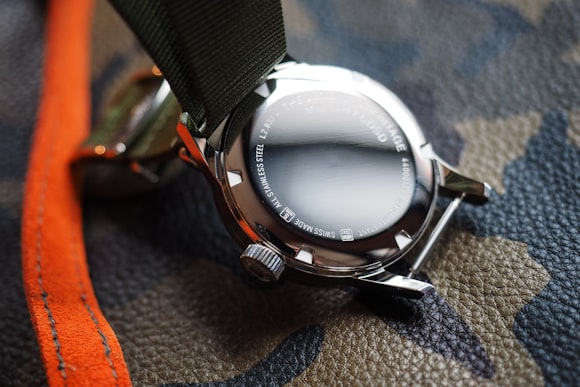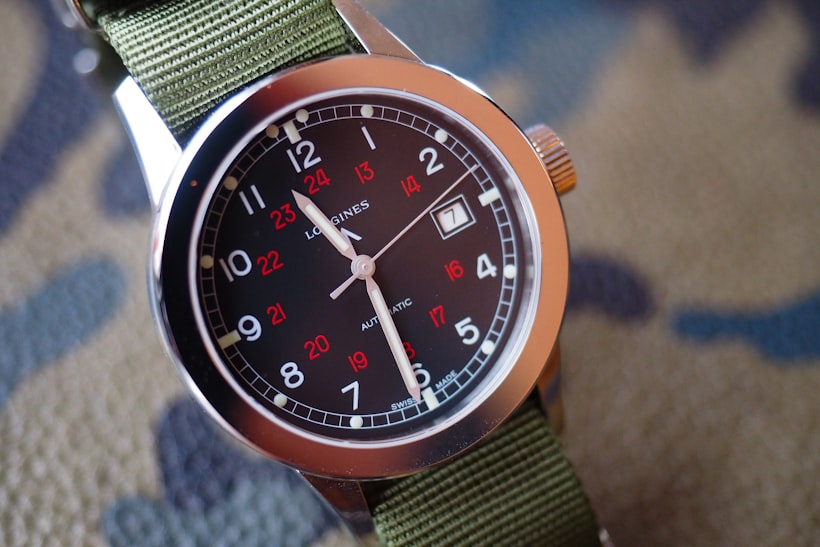Longines has been a Value Proposition favorite for very good reasons: thanks to their history, they have a pretty fantastic repertoire of great designs and historically important watches on which to draw, and the Heritage Longines watches are such an inexhaustible supply of great looking, reasonably priced vintage watches that I’ve often been tempted to just do the whole collection in one go and save you the trouble of reading a dozen different stories. However, sometimes a watch really is worth a stand-alone look-see, and the Heritage Military COSD is one of them.

The short version of the story is that the Military COSD is based on a watch issued to the British military – in particular, paratroopers – during the Second World War. As such it looks to have been a very, very straightforward timepiece, designed for two objectives: economy, and sturdiness. According to auction notes from a September auction at Watches of Knightsbridge in the UK, casing material was steel and nickel plate, and COSD is supposed to have stood for “Company Ordnance Supply Depot.” The movement is Longines caliber 12.68N, a gilt-finished caliber that’s rather plain in appearance but also gives the impression of the very high functional quality for which Longines was known. In this particular example the movement is suspended in the case in what looks like the shock-absorbing cushion some sources mention as being characteristic of the COSD and its use by paratroopers, and the case has fixed spring bars. They’re a fascinating slice of military history and as you might expect, the folks over at the Military Watch Forum have on several occasions gone very deep indeed into this watch; here’s a good place to start.

Now, one intriguing open question is whether or not COSD actually stands for Company Ordnance Supply Depot. It seems a reasonable assertion and Longines itself says that’s what it stands for, but some detective work by the folks at MWF leads to another piece of military hardware that carries the same initials: a rather fiendish weapon made for British Commando units, designed for silent killing. This is the (in)famous De Lisle Commando Carbine. The De Lisle carbine was one of the quietest weapons ever made; it had an integrated silencer (basically, the gun looks like a giant silencer the size of two tennis ball cans taped together – more properly called a suppressor – with a stock and receiver added as an afterthought) and fired a .45 caliber subsonic round. It was bolt-action only (a semi-automatic firearm is inherently noisier, due to the sound made when the action cycles) and was very much a covert/special operations weapon.

Combined Operations in the UK during World War II referred in general to multi-service-branch operations, and more specifically, to operations undertaken by Commando units, which had been formed in the wake of the disastrous rout of the French and British armies in France. In Winston Churchill’s words, they were to be “ . . . specially trained troops of the hunter class who can develop a reign of terror down the enemy coast.” For our purposes, it's interesting to note that the barrel of the De Lisle carbine is also marked COSD and it’s been suggested that it may actually stand for “Combined Operations Stores Division” or “Depot” – exactly the sort of fine, research-intensive, hard-to-establish point that makes vintage watch collecting so potentially interesting.


Whatever it may stand for, certainly the watches are classic examples of military hardware: almost brutally straightforward in general, and the originals were built to be as accurate and durable as they could be, with absolutely nothing inessential to get between them and the mission. The originals all appear to have been white dialed (at least, I haven’t seen any vintage black dial examples) and those that survived the War occasionally had their cases swapped out for nicer ones by their presumably grateful owners.

The re-issue we have has a black dial, and other than the movement, the main departure from the original is the presence of a date guichet. If you are the sort of person roused to indignation by that sort of thing you already know it; I’m not personally terribly fundamentalist about a date window, but it’s a deal-breaker for some. Another departure from the original is the use of conventional spring bars rather than the solid, soldered bars in the wartime COSD watches; I actually would have loved to see fixed bars on the re-issue but this is another situation where strict fidelity to the original would probably have made the watch a bit harder to sell. On the dial is the Broad Arrow mark, which indicates British government property – this, too, has some interesting history behind it. The Broad Arrow was first used by the Office of Ordnance, which was created by King Henry VIII; it’s thought to have been introduced by Sir Philip Sydney, in whose family coat of arms the pheon, or heraldic broad arrow, can be found, in around 1585.

The original COSD watches I’ve seen all show all the marks you’d expect of heavy use, and the re-issue we have here is unlike them in one pretty noticeable respect: it’s very highly polished. That’s one way among many that I suppose watches intended for covert military operations have changed over the years; something that reflective probably would not fit the bill for today’s special/covert operators (who from what I’ve seen tend to – understandably – favor things like G-Shocks anyway). The high reflectivity of the finish might be a sticking point for some, but consider it another link back to a different time and a particular period in the evolution of special forces units, and their equipment.

Now, this is supposed to be a Week On The Wrist, so what’s with all the background information? Well, sometimes a huge chunk of the fun in a watch is the back-story, and that’s the situation here. It’s a very comfortable, very easy watch to wear, but taken alone, with only the background of other modern watches, it’s pretty plain-Jane. However, if you understand what’s behind a lot of the design cues, you really do feel, when you put it on, the pull of history that makes wearing a mechanical watch interesting. When we got this in from Longines it seemed pretty unremarkable to me, I’ll be honest, but knowing more about the original from which the re-issue is derived is where the pleasure is, and makes you see it in a different light – and it's a reminder that the most interesting watches are usually those that have a story to tell.
The Longines Heritage Military COSD is available from Longines online here; price, $1,700. 40 mm stainless-steel case; sapphire crystal with antireflective coating. Automatic movement, NATO type military strap; available with either opaline/white or black dial. Water resistance 30 meters/100 feet.
Don't have the HODINKEE App yet? Get years of amazing watch content plus new stories, breaking news, and access to great new features like HODINKEE Live, free on iOS.
No comments:
Post a Comment